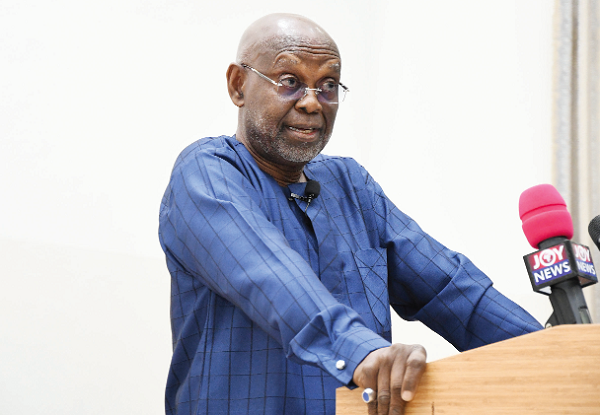
No need to panic over economic challenges
A former Minister of Finance, Professor Kwesi Botchwey, has said it is premature to push the panic button over the country’s current economic challenges.
He said although the country was currently in an economic crisis, a situation mainly occasioned by huge debts, it was crucial to first recognise that there was a crisis and proffer long-term solutions to address the challenges.
Advertisement
“The crisis is here and if it is not resolved, it will lead to a catastrophe. I'm not saying we should press the panic button but we should also not sit idle," he said.
Delivering an Independence Day Lecture organised by the One Ghana Movement,a Civil Society Organisation, in Accra yesterday, Prof. Botchwey, who is the longest-serving Finance Minister in Ghana’s history, said: “Recognising that you're in crisis is the first thing to do in addressing the problem and we must be sincere about it and level with the public to win their support.”
Lecture
The lecture, which was on the theme: “The State of the Nation’s Economy and Politics: 65 Years After Independence —The Path to Sustainable Development and Democratic Consolidation,” was meant to provide a constructive platform for engaging and shaping solutions for the socio-economic challenges and prospects of the country.
It was organised in partnership with the Department of Economics, and the School of Social Sciences of the University of Ghana, and had in attendance, people from academia, finance, politics and civil society organisations.
Discourse
Prof. Botchwey, who served as Finance Minister from 1982 to 1995, said in order to avoid falling into a catastrophe, there was also the need to create public space for national discourse on the way forward in solving the economic crisis.
“Unfortunately the nation is terribly polarised but if you do not create space for national discourse then the crises are going to beat you.The country needs to build consensus around the reforms that are necessary to resolve the nation’s credit worthiness,” he added.
Strides
The economist, a one-time advisor to the United Nations Development Programme (UNDP), said in spite of the strides made in its development journey, the county had not fully succeeded in realising its full potential.
He added that considering the county’s progress in the development journey, it would be difficult to alleviate the poverty situation of many of its citizens, hence the need for the government to open up for wider discourse on the country’s development.
“We’ve come a very long way in our development journey as a nation since independence. But behind all the sounds and furious claims and counter claims; which may not be born out of facts, we clearly have not succeeded in liberating our full potential as a nation,” he stated.
Therefore, he said the time had come for everybody to sacrifice and share in the economic burden as part of the solutions needed to get out of the crises.
Going to IMF or not
Prof. Botchwey, who had conducted a number of consultancy projects for the World Bank and the International Monetary Fund (IMF), observed that the economic hiccup had been compounded by the belief that the country was not creditworthy.
“When money is borrowed, it is required that we put our public finances in a position to settle our debts. When servicing our debts can only be done at the expense of delivering public services, especially to the poor and vulnerable, then we are in trouble.
“This is the predicament that we find ourselves in today. The issue really is not whether we go to the IMF or not. That is a red herring. Indeed, we are a sovereign nation, and a proud one at that and can decide as to whether or not to seek after the IMF. The IMF with all its power and leverage can simply not force a programme on us or any country,” he stated.
Solutions
Prof. Botchwey proffered some solutions for restoring macro-economic stability.
He said the main issues with the country’s public finances were structural and would require a thorough review of all sources of pressure in the budget including every flagship programme and its sustainability and impact to tackle the issues.
“We must not for instance transition temporary spending incurred during the pandemic into permanent public spending, when we are already struggling to collect revenues.
“We must resist the lure of solutions that will further mortgage the future of young generations to come, such as collateralising public revenue streams and, above all, we must resist delaying hard decisions, he added.
Furthermore he said: “Recognising that there are crises, understanding and respecting the views of others, transparency, and winding down arrogance and show of impunity that the people see in some section of our political elite is the way forward”.
Democracy
Speaking on the consolidation of the country’s democracy, Prof. Botchwey said the country’s key institutions of democracy including the Electoral Commission, the media, Auditor-General, Lands Commission, Media Regulatory Bodies, among others, must not be undermined since the nation’s growth depended on them.
“If we undermine the institution of the Auditor-General or the EC, we are doing the country a big harm,” he added.
Panel discussion
There was a panel discussion which featured Prof. Botchwey and two other economists- Prof. Abena D. Oduro, an Associate Professor of the Economics Department of the University of Ghana, and Dr Nii Kwaku Sowa, an investment consultant.





